
















|
Israel - three months on a Kibbutz
by Chalerm Raksanti
There are crossroads in life where one comes upon opportunities and choices. If you miss the opportunity, it may never come round again. And if you grab the
opportunity, you may as well throw away the road map you were travelling with and borrow someone else’s guidebook; because you will surely need it. An ancient Chinese proverb
tells us that sometimes, it is not always the destination which is the purpose of the journey, but rather, it is what you experience along the way. Volunteer work on a kibbutz
in Israel is one of those journeys.
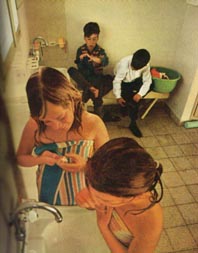 Children are raised in cr่ches,
which frees their parents for work Children are raised in cr่ches,
which frees their parents for work
A kibbutz is a communal farm. The word kibbutz means ‘group’ in Hebrew. Its men and women believe that through their shared labour they will enjoy
a better way of life. The first kibbutz, Deganya, a few miles from the borders of Syria and Lebanon, was formed in 1909. It was originally a swamp which had to be cleared,
drained, and cultivated. Today it is a large thriving community, modern and self sufficient.
The concept of the kibbutz came from the determination of men and women who fled Tsarist oppression in Russia after the turn of the 20th century, and came to what was then referred to as Palestine, looking for a new life. Although many disavowed god and ritual Judaism, these pioneers nonetheless
remained deeply rooted in Jewish history and ideals. They were convinced that only by returning to the soil would they, as Jews, shed the accumulated grime of centuries of
wandering through other peoples’ countries, without ever having one of their own. And then, through the purification of hard physical labour, they would rebuild themselves
and the land. Others came to join them. Some to stay, and some only come to learn and move on to form similar villages. There are now thousands of kibbutzim which dot the
countryside.
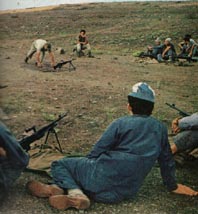 Honing military skills Honing military skills
As a volunteer worker, I chose kibbutz Ha On, just a few miles from Deganya, in the Jordan Valley. It is a ‘front-line’ border kibbutz, sandwiched
between the two hostile nations of Lebanon and Syria. The settlement covers about 1000 lush acres of farmland, vineyards and orchards, and hugs the south-eastern shore of Lake
Kinneret, which is 700 feet below sea level. The panorama is beautiful. The kibbutz slopes down gently to the lake shore and the stark hills of Galilee sprawl across the water
on the opposite side. But the neighbours are deadly. This is the disputed and occupied area of the Golan Heights. The night guards walk duty with submachine guns slung over
their shoulders.
Ha On is as much a military defence post as it is a prosperous agricultural community. The 45 mile frontier which runs from the lake, houses old Syrian
bunkers and gunner emplacements. Kibbutz Ha On has underground bomb shelters which can accommodate the entire community, complete with food storage, and pull-down bunks, in
case of shelling attacks. The soldiers on the kibbutz do double duty. Everyone here works at a job. All Sabras, as native-born Israelis are called, serve a mandatory 3 years in
active military service, both men and women. After my three months of volunteer work on the kibbutz was completed, I went sightseeing for another month with three Sabra women
soldiers who were on leave from duty. All travelled the whole time in army camouflage, and all three carried Uzis, even on the public buses and into the youth hostels at the
day’s end.
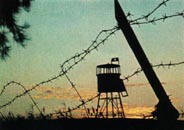 Barbed wire and concrete bunkers Barbed wire and concrete bunkers
Volunteer work on a kibbutz is hard labour and rough living. Volunteers come from all over the world, and some book years in advance for the privilege. While
I was at Ha On, there were young people from 18 different countries who spoke seven different languages. None of us spoke more than a smattering of Hebrew. Some of us spoke
none. Volunteers are housed in dormitories, the sexes are separated, but the shower buildings are communal. There is no air-conditioning and the summer heat can soar to 120 F
as early as May. We were arbitrarily assigned jobs which were posted on a roster in the communal dining hall every day. I was assigned to the lemon orchards, and then
eventually graduated to harvesting table grapes. My three days of kitchen duty apparently caught the eye of someone in charge. All of those chipped plates and broken glasses
had paid off. I preferred to labour in the fields. The work is drudgery, but at least it is in the open air.
The permanent community on the kibbutz shares a lifestyle of a Marxist commune. For example, the children live apart from parents and are housed separately
according to age in cr่ches. This system of childcare evolved both from the need to free women for work and military service, and from the emphasis on the group, rather
than the individual or family.
 Kibbutz Ha On on the shores of
Lake Kinneret Kibbutz Ha On on the shores of
Lake Kinneret
A new mother cares for her baby at home for the first six weeks. After that, as she gradually spends more time at work, the child sleeps in the infants’
quarters, watched over by an experienced nurse. Later the child joins toddlers of his own age in groups of five or six, and it is here where he takes his first steps in
communal living. Under the constant supervision of a nursemaid, the children live together day and night and share everything. There is still time for the family as a unit, and
the child never mistakes the nurse for the mother. This system is more flexible now in many kibbutzim, and often the children come home to sleep at night with their families.
Communal cooking in Israel will never excite the gourmet, but the meals which are wheeled to the tables on stainless steel trolleys are balanced and filling.
The main meal is at mid-day; usually hot soup, huge salads, mountains of cooked vegetables, freshly baked bread, pita, and a kind of risotto which might taste meaty, but
isn’t. During my stay, there was no meat served. We were all enforced vegans except on Sundays, when chicken or turkey was served. A regular staff prepares the food, a
semi-permanent crew sets and clears the tables. Volunteer workers do all the cleaning up.
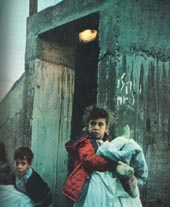 Underground bomb shelter at Kibbutz
Ha On Underground bomb shelter at Kibbutz
Ha On
Kibbutzniks are rather like Puritans in some ways. Most do not drink, smoke or gamble. However, since the average age on a kibbutz is around 26, they love
music and movies. Some kibbutzim have discos, swimming pools, and tennis courts. Not front-line regions like the Golan Heights, but closer to the larger cites. Other
communities have surprising luxuries. But unlike the Puritans, religion is conspicuous on a kibbutz, only by its absence. To most Kibbutzniks, the Bible is pure history.
Israelis consider it the written and recorded deed of ownership of the country. The kibbutz has no synagogue, no resident rabbi, no formal religious services on the Jewish
Sabbath, nor any hard and fast dietary rules. The older people may wish to individually observe religious rituals, but with the young Sabra, orthodox custom holds no sway. The
kibbutz lifestyle may appear to be successful Marxism, but the structure and organisation is pure democracy. It is self governing, managed through committees and general
discussions. The people who live there set the course through weekly (and often highly animated) meetings.
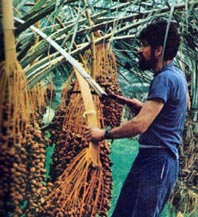 Volunteer worker harvesting dates Volunteer worker harvesting dates
There are two more ingredients which make up the complexity of the kibbutz. It is not apparent to the casual observer. The success and prosperity of the
village, and the camaraderie of a group working together can overlap and disguise an underlying tension. Firstly, one eventually realises that even the most dedicated member
may not find Utopia at the kibbutz. As in any small community, personal differences and lack of privacy can produce restlessness and dissatisfaction. For some, the idealism may
pale, and the city’s bright lights, seen from the mud of the farm, may glitter irresistibly. And they may leave.
The other element is best described as subtle paranoia. An undercurrent of insecurity is felt all through the nation. This is not fear; these people are not
afraid. They are wary. And well they should be. They lie in the path of mighty nations which are dedicated to their destruction and elimination from existence. Barbed wire and
concrete bunkers are as much a part of their everyday life as farm tools and kitchen equipment. Trenches snake through their garden paths. They cut the bottom branches from the
surrounding trees in order to spot enemy snipers sneaking into the parameters. Native born Israelis are called Sabras, named for a cactus fruit gown in the desert. The fruit is
tough and prickly on the outside, tender and sweet on the inside. It is this duality of nature which one detects in the close quarters of the kibbutz. One should savour these
people, for they are truly delicious. But handle them with care.
The Doulos - the cruise liner that can do lots for mankind
Why would anyone fill a grand old ocean liner with library books and sail around the world? A look at the name of this vessel gives the clue - “Doulos”
means “servant” and its crew from thirty-five nations has taken it upon themselves to serve the world with literacy, education and international understanding.
The Doulos and the hard working crew are now here, only one of the 85 countries it has visited with its international message over the past 20 years.
Welcoming this vessel to Laem Chabang was the governor of Chonburi, Sujarit Pachimnan and the governor of the Tourism Authority of Thailand, Zone 3, Manit
Boonchim. At the ceremony it was revealed that the Doulos will be standing to attention at the Laem Chabang Port until January 29. Not only affording us the opportunity to
buy excellent and very inexpensive books from this marvelous floating bookshop but also to participate in its cultural exchange programmes. The crew will be on board to
welcome you from 10 a.m. Monday to Saturdays and 2 p.m. to 9 p.m. Sundays. For this, a modest entrance of 10 baht is asked.
 Director Lloyd Nicholas (left)
and Manit Boonchim Director Lloyd Nicholas (left)
and Manit Boonchim
Browsing the bookshop’s over 6,500 titles (1 and a half thousand of which are in Thai, the remainder in English) uncovers a breadth of subjects from
classic novels, craft, science, sport cooking, art, children’s books, health, maths, science, technology, religion and animals.
Additionally there are many other events in and around the ship. These include a Lighthouse Cafe, an opportunity to sit in a relaxed atmosphere and speak
with the crew, and a Family Day with clowns, music and face painting.
On the night of January 27 there will be a two-hour multi cultural performance of drama, songs, dances and mimes. For more details you can call the Doulos
office on (038) 361731 during office hours.
The ship itself has a fine history. Built in 1914 and named the Medina, she was refitted 20years ago and re-commissioned as the Doulos, which is owned by a
German charity, G.B.A., meaning Good Books for All.
 Books on review Books on review
The Australian director of GBA, Lloyd Nicholas, who was on board with his wife and three children explained, “The Doulos programme isn’t just about
books, in many ways it is all about people. We are all here to serve. We are all expressing our gratitude to serve the international community with education, real
friendship, peace, harmony and love, and also gain cultural and life experience. For many of us it is our first time in Thailand and experiencing the Thai culture. The
GBA’S ideals are firstly for the crew to learn about life; experience the richness of life, the diversity of the world. Our world is a complex place and if we are going to
live in peace and harmony with each other, which is our goal, we must learn to respect each other. Living together in a multi cultural community teaches the crew about
leadership. Learning how to lead in a world of great change is important. It is just not enough to understand different customs and learn the language, we have to understand
how to really love each other. The love we have experienced is the love from God himself. It is our desire to share this love of God with all the people we sail and all the
people who visit us.”
It is amazing to learn that the majority of the GBA funding comes from the crew itself. 65% in fact comes from the crew who, far from receiving salaries,
are mostly sponsored and pay approximately $450 USD per month to be on board. Another 20% - 25% comes from book sales and the rest from world wide donations.
The Doulos first port of call in Thailand was Sattahip where they averaged over four and a half thousand visitors a day during the two weeks there. Her
next ports of call will be Bangkok, then Vietnam and Singapore.
Teachers and officials receive training on dangerous chemicals
More than 70 people, including local government officials, school administrators and teachers in the city’s school system were given training on the
dangers of chemicals used in pesticides, fertilizers and other commonly used items.
The training, which took place at city hall on January 10, was presented by officials from the Chonburi Provincial Environmental Office, and was supported by
the Electric Generating Authority of Thailand, the Environmental Quality Improvement Department and the Energy and Environmental Development Foundation.
As part of the training, a team of resident experts was formed to further disseminate the information to increase local awareness in the community.
Pattaya City mayor Pairat Suttithamrongsawat opened the training session by referring to the Ministry of Interior’s devotion to His Majesty King Bhumibol
Adulyadej’s plan of economic self-sufficiency through enhancing and supporting the agricultural sector.
Recent directives issued by the Ministry of Interior instruct each province to implement training programs to alert consumers and increase the awareness in
agricultural communities to the dangers involved with the use of various pesticides and other chemicals contained in fertilizers. The nation-wide program for 2001 is titled
“Healthy Communities Free of Dangerous Chemicals Improving the Quality of Life”.
Following the classroom training, the “Environmental Preservation Team Members” are scheduled to visit environmentally safe agricultural programs in
progress in Korat and Phitsanulok during a field trip January 18-19.
Local educators who took part in the training will teach it to students in the classroom, while officials in related fields will incorporate the information
into public awareness programs.
Face it! (Part 2)
by The Beauty Explorer
After the first treatment I got from Napaporn Wentworth of The Beauty House Pattaya, I really was admiring myself in the mirror. Yet, as I wrote in the
first part, the beautician didn’t give me enough time, being afraid I could sit there and get treated for the rest of the day. Instead, she told me that another part of the
“Grand Pamper” was waiting, and she directed me into another room and asked me to take a shower. Smelling my armpits, I thought that it wasn’t too bad, but I obeyed.
After coming out of the shower, I was directed to lie down on the massage table where the girl started to give my entire body a Dead Sea Salt Scrub.
Didn’t feel bad at all, I had to admit. This salt is created from authentic Dead Sea water, being pumped directly into solar evaporation pools where its salts are naturally
crystallized. The crystals soften the skin, relax the muscles and clean not only the body but also the mind.
After 30 minutes of scrubbing and after taking another shower, the result was visibly smoother skin, with a natural healthy glow. Back on the table, the
girl started to smear some black paste onto my body, making me look like I had spent weeks laying in the gutter, which reminded me of my mother. Not that she was ever laying
there, but she had always told me, if I didn’t take care of myself then one day I might end up there... Anyhow, the paste turned out to be a Dead Sea Mud Pack. Captured
within is a high concentration of minerals and this mud is found in its natural form on the banks of the Dead Sea. It is comprised of layers of sedimentary clay formed over
thousands of years. Finally, I was wrapped in plastic, covered with another huge towel and put to rest for another half hour.
Dozing away again, I felt warm and comfortable and it was only under protest that I took another shower, but after that the real treat was waiting for me:
The Aromatherapy Massage. It’s hard to describe, because it was absolutely relaxing. Hand-war oil was used to give me the massage of my life and it took so long until the
last drop of the oil had disappeared into my skin. And, surprise, surprise, I wasn’t asked to take another shower! It would have been a shame anyway, since my skin felt so
soft and perfect, probably feeling like this for the first time since I was a baby.
After the 31/2 hour treatment of the Grand Pamper, I paid 3,900 baht. My purse got a bit smaller, and yet I left the beauty house richer. Richer in spirit,
well being and beauty and I could prove it, since all my friends were surprised by my healthy looks and the glow of my skin. I promised myself to try out more and I will tell
you all about it the next time.
To be continued...
Are you interested in treatments or special packages for yourself or for your loved ones? Just call Khun Nok, tel. 361749 - 50 for more information. There
is always a reason to get pampered!
Chinese Chance, Year of the Snake (Part Four)
by Anchalee
Prescription for the Future
Slender Snake, you are a wise and individualistic human being. Your talents are many. Most important for your survival is that you find a vehicle through
which you can express your wealth of gifts. It will usually not be discovered in another person’s soul. You are not really a dependent type. So don’t ever be so foolish
as to think that this marriage or that partnership is just exactly what you need to stabilise yourself. Looking for equilibrium in another person, even if they have it to
offer, will never quite satisfy you.
 The reason for this warning about relying on others for your security is that, more
than most other people you are tempted by this solution. Forget it. That rich man who proposes to buy you all those goodies, although he may improve your surroundings, will
not be able to provide the personal achievement you demand of yourself to be happy. Make yourself comfortable. Go to work on your own inhibitions about joining the daily slog
right away. You are too smart to put up with your own character weaknesses for long. Find a career or make a good home for your family. Devote yourself to it. Or else,
self-hate and disappointment await you in later life. The reason for this warning about relying on others for your security is that, more
than most other people you are tempted by this solution. Forget it. That rich man who proposes to buy you all those goodies, although he may improve your surroundings, will
not be able to provide the personal achievement you demand of yourself to be happy. Make yourself comfortable. Go to work on your own inhibitions about joining the daily slog
right away. You are too smart to put up with your own character weaknesses for long. Find a career or make a good home for your family. Devote yourself to it. Or else,
self-hate and disappointment await you in later life.
Get down to business. Stop clinging to traditions that are no longer useful. Don’t procrastinate. If you try, you will find that you are capable of quick
decision-making. What worries you is that your decision may be the wrong one. That is when your judgement must come in, put its foot down, and take responsibility. If you
make a foolish move, swallow your pride and take the consequences. You can always pick yourself up and start all over again. Perhaps you are not certain that you can, so you
hesitate. You shouldn’t. Everyone makes mistakes. We all get our clothes mussed from time to time. Looking ridiculous for a little while never really hurt anyone. But
remaining that way is dangerous. If you make a fool of yourself, go home, put on a pot of coffee and make a list of all the good qualities you know you have. A second list
should include all the possible solutions to your problems. And instead of making a third list, set yourself to attacking each day as it comes. You really can be happy.
Because you want to find your salvation in others, and if those people you call on for help don’t give you what you need, you are inclined to blame them.
You can be vengeful. You almost never make brash scenes; however, you can seethe with rage and anxiety.
Overcoming this steak of revenge in yourself could be more deftly handled if you humble yourself once in awhile. Reach out and make the first move to
settle differences. It does wonders for the soul. Basically you are a kind person. You deplore hurting others. But you cannot tolerate any show of indifference on their part,
so you strike out and often hit below the belt.
You are endowed with natural superiority. Most people recognise this in you. But woe be unto those who don’t. Historically, cataclysmic things sometimes
happen in the Year of the Snake. Stock markets come crashing down. Wars break out. It’s not a surprise when you realise how much self-righteousness is in the air during
those years.
Relax, lovely Snake. Take yourself and others a bit less seriously. There is no doubt the world is a disappointing and imperfect place. With a little more
mental effort from wise people like yourselves, it could be improved. Write that book. Take those piano lessons. Practice. Stay with it. The rewards, because you are very god
at whatever you undertake, cannot help but come back a thousand fold.
The British Chamber first into the New Year
The British Chamber of Commerce Thailand (BCCT) was the first this year, of the many chambers of commerce, to hold a networking evening. This was held at
Shenanigans Pub, a venue well known by the members of the BCCT. With sponsorship from Unithai Shipyards and Engineering and Shenanigan’s themselves, the networking night
was a great success. John Swift from Unithai briefly addressed the assembled multitude, exhorting them to drink up while the sponsored beverages held out and to enjoy
themselves.
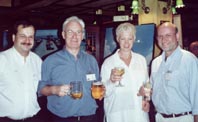 (L to R) Greg Watkins, Peter
Currie with his lovely wife, and Graham Macdonald (L to R) Greg Watkins, Peter
Currie with his lovely wife, and Graham Macdonald
This suggestion was not taken lightly, with Kim Fletcher and the Shenanigans staff kept running while the BCCT members networked strongly. Amongst those
who had made a special trip to Pattaya for the evening was Peter Currie, ex GKN supremo on the Eastern Seaboard, and now working for the company in Germany.
 John Swift from Unithai
addressed the assembled multitude, exhorting them to drink up and enjoy themselves. John Swift from Unithai
addressed the assembled multitude, exhorting them to drink up and enjoy themselves.
Unithai personnel were obviously well to the fore, with Gerrit de Nys, the CEO of Unithai being his usual charming self, along with his trademark cigar,
while newcomers such as John Hunter from their Health and Safety division were looked after by Maj. Adhaya Visvayodhin, the PR Director from the shipyards.
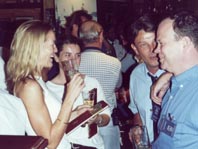 The evening was meant to be fun,
and the directive was taken seriously The evening was meant to be fun,
and the directive was taken seriously
The Eastern Seaboard representative of the BCCT, Graham Macdonald, was very pleased with the first meeting for the year and has indicated that there will
be a full calendar of events in 2001, with networking evenings scheduled every month. The Pattaya Mail will have details of the next meeting in a couple of weeks.
Chicago John - live, solo and here
Acclaimed international musician Chicago John will be playing in Jomtien next weekend. MoJo Nightclub has managed to secure the billing for Saturday the
27th, with nightclub owner Monika Rottmann thrilled that her new venue has been given the opportunity to showcase Chicago John’s talents.
 Chicago John will be live at MoJo
on Saturday the 27th. Chicago John will be live at MoJo
on Saturday the 27th.
Chicago John, whose real name is John Gonzalves, is a Portuguese American who plays guitar because he has to. Ever since picking up his first guitar when
aged ten years old, music has just flowed from his fingers. Add to that a voice which is reminiscent of Paul Simon and Cat Stevens heavily overlaid with the Blues, and you
have a solo act that will hold the listeners spell-bound for hours.
Chicago John has spent the last ten years performing in Europe, after leaving his native America where he had become one of the leading exponents of the
Mississippi Delta Blues style of playing.
Currently, he is just passing through, guitar in hand and will give this one solo concert. Monika says that it is best to book seats for this concert,
either directly at the nightclub behind the Jomtien Complex Condotel or by phone 01-268 6836. Chicago John will be on from 9 p.m., food is available, and there is no cover
charge. (Having heard Chicago John previously, this is one concert you should not miss. Dr. Iain)
Gay festival may be coming to Pattaya
Following the great success of the Bangkok and Phuket gay festivals, which attracted in excess of 200,000 tourists, a committee has been formed to organise
a gay festival in Pattaya. The committee hopes that this will be held from the 29th November to the 2nd Dec 2001.
The festival will consist of an opening ceremony, many special events including a street party, a dog show, an art exhibition, etc., culminating with a gay
parade with many fabulously decorated floats, after which a huge party will be held in a suitable sized local venue. It is the purpose of the festival to raise money for two
local charities, which have yet to be named, while at the same time promoting Pattaya as a wonderful holiday destination.
 A spokesman for Utopia Tours, the largest gay incoming tour operator in Thailand,
Mr. Robert Scoble was quoted as saying, “We are very excited at the prospect of Pattaya having it’s own gay festival, as in the last two years the Bangkok and Phuket
festivals, which are held following one and other in November, have proved to be extremely successful and have brought in 10s of thousands of foreign visitors benefiting many
Thai businesses including hotels, restaurants, bars and department stores and so on. The large cities of the world such as London, Sydney, Paris, New York, Toronto, and San
Francisco have all realised the huge potential of the gay traveler and the pink dollar. The gay festivals in these cities are all heavily backed financially by their
respective tourist boards and city councils. Utopia Tours are actively setting up T.A.T.A, the Thai Alternative Travel Association, and are discussing this association with
the Tourist Authority of Thailand so they can jointly tap into this huge gay travel market.” A spokesman for Utopia Tours, the largest gay incoming tour operator in Thailand,
Mr. Robert Scoble was quoted as saying, “We are very excited at the prospect of Pattaya having it’s own gay festival, as in the last two years the Bangkok and Phuket
festivals, which are held following one and other in November, have proved to be extremely successful and have brought in 10s of thousands of foreign visitors benefiting many
Thai businesses including hotels, restaurants, bars and department stores and so on. The large cities of the world such as London, Sydney, Paris, New York, Toronto, and San
Francisco have all realised the huge potential of the gay traveler and the pink dollar. The gay festivals in these cities are all heavily backed financially by their
respective tourist boards and city councils. Utopia Tours are actively setting up T.A.T.A, the Thai Alternative Travel Association, and are discussing this association with
the Tourist Authority of Thailand so they can jointly tap into this huge gay travel market.”
Anyone wishing to become a sponsor of the Pattaya Gay Festival should contact one of its founders, Jim Lumsden at the Ambiance Hotel on 038 421910 or by
e-mail to lumsdenj@loxinfo.co.th
Copyright 2001 Pattaya Mail Publishing Co.Ltd.
370/7-8 Pattaya Second Road, Pattaya City, Chonburi 20260, Thailand
Tel.66-38 411 240-1, 413 240-1, Fax:66-38 427 596; e-mail: ptymail@loxinfo.co.th
|

The Rotary Club
of Jomtien-Pattaya

Skal
International

Pattaya
Fun City
By The Sea
|
 Children are raised in cr่ches,
which frees their parents for work
Children are raised in cr่ches,
which frees their parents for work Honing military skills
Honing military skills Barbed wire and concrete bunkers
Barbed wire and concrete bunkers Kibbutz Ha On on the shores of
Lake Kinneret
Kibbutz Ha On on the shores of
Lake Kinneret Underground bomb shelter at Kibbutz
Ha On
Underground bomb shelter at Kibbutz
Ha On Volunteer worker harvesting dates
Volunteer worker harvesting dates Director Lloyd Nicholas (left)
and Manit Boonchim
Director Lloyd Nicholas (left)
and Manit Boonchim Books on review
Books on review The reason for this warning about relying on others for your security is that, more
than most other people you are tempted by this solution. Forget it. That rich man who proposes to buy you all those goodies, although he may improve your surroundings, will
not be able to provide the personal achievement you demand of yourself to be happy. Make yourself comfortable. Go to work on your own inhibitions about joining the daily slog
right away. You are too smart to put up with your own character weaknesses for long. Find a career or make a good home for your family. Devote yourself to it. Or else,
self-hate and disappointment await you in later life.
The reason for this warning about relying on others for your security is that, more
than most other people you are tempted by this solution. Forget it. That rich man who proposes to buy you all those goodies, although he may improve your surroundings, will
not be able to provide the personal achievement you demand of yourself to be happy. Make yourself comfortable. Go to work on your own inhibitions about joining the daily slog
right away. You are too smart to put up with your own character weaknesses for long. Find a career or make a good home for your family. Devote yourself to it. Or else,
self-hate and disappointment await you in later life. (L to R) Greg Watkins, Peter
Currie with his lovely wife, and Graham Macdonald
(L to R) Greg Watkins, Peter
Currie with his lovely wife, and Graham Macdonald John Swift from Unithai
addressed the assembled multitude, exhorting them to drink up and enjoy themselves.
John Swift from Unithai
addressed the assembled multitude, exhorting them to drink up and enjoy themselves. The evening was meant to be fun,
and the directive was taken seriously
The evening was meant to be fun,
and the directive was taken seriously Chicago John will be live at MoJo
on Saturday the 27th.
Chicago John will be live at MoJo
on Saturday the 27th. A spokesman for Utopia Tours, the largest gay incoming tour operator in Thailand,
Mr. Robert Scoble was quoted as saying, “We are very excited at the prospect of Pattaya having it’s own gay festival, as in the last two years the Bangkok and Phuket
festivals, which are held following one and other in November, have proved to be extremely successful and have brought in 10s of thousands of foreign visitors benefiting many
Thai businesses including hotels, restaurants, bars and department stores and so on. The large cities of the world such as London, Sydney, Paris, New York, Toronto, and San
Francisco have all realised the huge potential of the gay traveler and the pink dollar. The gay festivals in these cities are all heavily backed financially by their
respective tourist boards and city councils. Utopia Tours are actively setting up T.A.T.A, the Thai Alternative Travel Association, and are discussing this association with
the Tourist Authority of Thailand so they can jointly tap into this huge gay travel market.”
A spokesman for Utopia Tours, the largest gay incoming tour operator in Thailand,
Mr. Robert Scoble was quoted as saying, “We are very excited at the prospect of Pattaya having it’s own gay festival, as in the last two years the Bangkok and Phuket
festivals, which are held following one and other in November, have proved to be extremely successful and have brought in 10s of thousands of foreign visitors benefiting many
Thai businesses including hotels, restaurants, bars and department stores and so on. The large cities of the world such as London, Sydney, Paris, New York, Toronto, and San
Francisco have all realised the huge potential of the gay traveler and the pink dollar. The gay festivals in these cities are all heavily backed financially by their
respective tourist boards and city councils. Utopia Tours are actively setting up T.A.T.A, the Thai Alternative Travel Association, and are discussing this association with
the Tourist Authority of Thailand so they can jointly tap into this huge gay travel market.”
